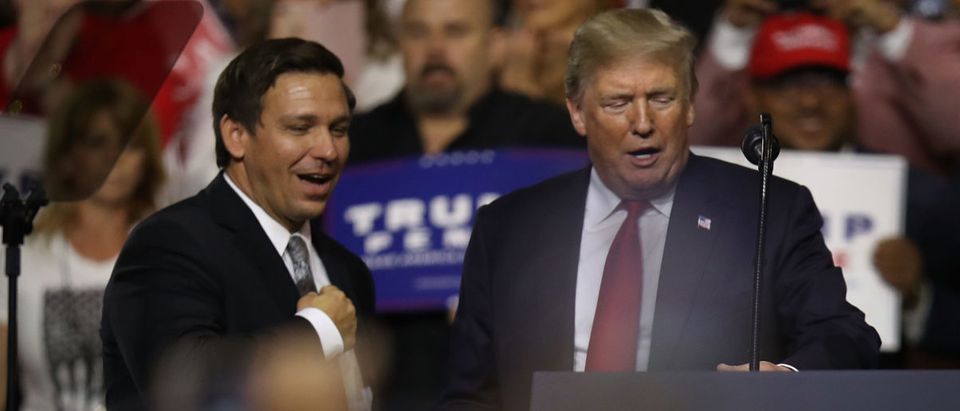The country is awash in speculation about presidential nominees for 2024 from each party, with the Republican leaders, Donald Trump and Ron DeSantis, and Democratic leaders Joe Biden and Kamala Harris, already profoundly disappointing major portions, perhaps majorities, of their party’s faithful.
In my half century of teaching a course on political persuasion to young potential voters, I always warned them to be wary of thinking that any particular presidential candidate constituted “The Answer.” I told them that charismatic candidates often received high intensity among their supporters, but that time and further examination would indicate that such zeal was almost invariably undeserved.
I implored them to be Type-B voting personalities, i.e., not to be overly eager to follow with unbridled support candidates about whom they were partially informed, candidates who were complicated and had potential downsides that should perhaps disqualify them from being in the highest office in the land.
Every presidential election yields the frequent warning that you should vote in this election as if your life depends on it or that “This is the most important election ever.”
Some, including this writer, have pooh-poohed those clichés as nothing more than that: self-centered platitudes by those who think that every current issue is the world-defining issue of all time.
I humbly confess, that contrary to my perennial advice, 2024 may be the first such ultra-critical election since 1980 (see below).
Also, with presidential nominees in 2020 topping in combined age 150 years, perhaps finally the electorate should begin to look also more closely at vice presidential nominees, who, pollsters tell us, are almost never a major consideration in the electorate’s voting. From Aaron Burr in 1796 (who found time to kill Alexander Hamilton in a duel during his vice presidency) through Communist-leaning Henry Wallace in 1940, forever-young-and-callow Dan Quayle in 1988, and wild-card Kamala Harris (2020) there have been vice presidents whose elevation to the presidency could have been – one might say “likely would be” in the case of Harris — destructive to the nation. Voters must pressure early decisions by prospective 2024 presidential nominees to choose an excellent vice presidential nominee, and that should be part of the voters’ decision-making criteria for president.
On to some advice on presidential primary selection for voters:
(This author has joined those I would have in the past described as the “Chicken Littles:” The world may be at risk for the first time since the last century with the next election.)
- Should You Vote? The consensus from pundits and opinion leaders is that everyone eligible should vote. Not here. If you don’t know the candidates and/or acquaint yourself with their positions on critical issues, don’t blindly vote at all.
- What Issues are Dispositive? Issues are always multifarious: what is your candidate’s economic policy, his or her foreign policy, policy on crime? There is no candidate who will satisfy any thinking voter’s multitude of criteria. You should not eliminate candidates just because you don’t see eye to eye on everything; sometimes you must choose the relative advantage of one candidate over the other. Generally, you should not be a single-issue voter — with a caveat in 2024: Foreign policy, often an afterthought of candidates, may be foremost in a wise voter’s mind: the China-Russia-Iran-Korea Axis may be the most formidable axis and threat to world peace since the Axis Powers of the last century.
- Are There Personal Issues? What are the candidate’s personal peccadilloes? Their ages, yes their ages. Their position on cabinet members? Their tolerance for personally feathering their own nest? Their personal psychology – do they listen to advisors? Is there a vice presidential nominee who would be ruinous if your candidate wins and dies or becomes disabled while in office?
- Should You Vote Early? Conceptually, early voting is irresponsible for many reasons: it encourages uncommitted voters to vote without sometimes hearing critical exchanges or learning about late-emerging issues just as the elections and pressure on candidates get tense. Furthermore, liberals pile on to discourage implicitly conservatives from voting as hints of early voting results are published. The only remedy, outside of repealing lengthy early voting opportunities, is to vote early yourself.
I did not vote for either Trump or Biden, or Trump or Hilary, because I could not be responsible in my mind for any of those three being president.
I anticipated sufficiently being excited by Ron DeSantis for 2024. Whoa – not so fast: as George F. Will wrote (The Washington Post, March 19), “Ron DeSantis termed Russia’s attempted murder of Ukraine ‘a territorial dispute.’ In 1938, Neville Chamberlain expressed similar thinking about Adolf Hitler’s ‘dispute’ with Czechoslovakia: ‘A quarrel in a faraway country between people of whom we know nothing.’ ” Some pundits say they’re tired of hearing about Neville Chamberlain – too bad; he’s relevant.
DeSantis has taken a position that has lost this conservative voter’s support, not because I am a single-issue voter but because this issue is dispositive: He implies he might limit our support for Ukraine to the point of giving control of that country to Russia. And then maybe Poland, and maybe Taiwan to China with a “tut-tut.”
The first change that responsible voters must effectuate is voting to win primaries. Historically, far too many “serious voters” have left it to others to determine the nominees for president and vice president.
Not in 2024 … if you vote at all, vote in the primaries, vote early to pressure your candidate to choose a vice president who would make a good president and choose well for president.
Richard E. Vatz, retired, was professor of political communication at Towson University for almost a half-century and was political editor of USA Today Magazine 1985-2022; he is author of “The Only Authentic Book of Persuasion: the Agenda-Spin Model” [Authors Press, 2022]
The views and opinions expressed in this commentary are those of the author and do not reflect the official position of the Daily Caller.



